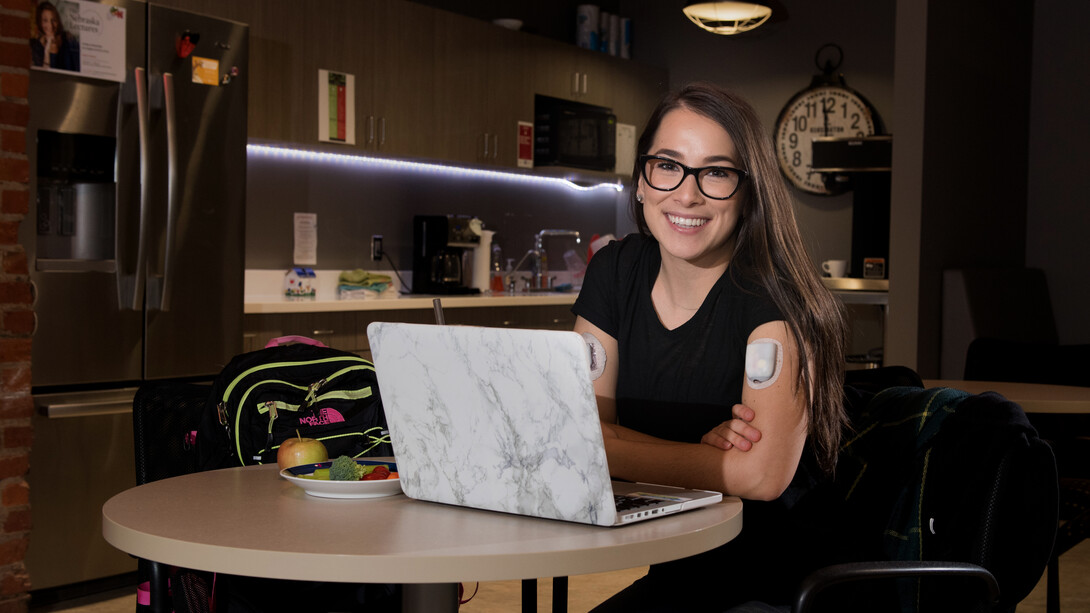
In the fall of 2015, Jacinta Benton felt like her world was changing. She was lethargic and felt depression and anxiety creeping in on her.
Previously, the sophomore at the University of Nebraska-Lincoln had been a high-achieving, gregarious and outgoing person, but suddenly she just wanted to stay at home, sleep a lot, and was unmotivated to do her college coursework.
She realized she needed help. Benton, who is a Lincoln native, spoke with a nun, her academic adviser and a counselor with Counseling and Psychological Services on campus.
“I’m a spiritual person, and so I reached out in every aspect of my life in order to get support and help,” she said.
She received excellent support from everyone, she said, but she didn’t immediately go to the doctor, and continued to struggle and started losing weight.
“I don’t remember who I spoke to or what kind of pushed me over the edge and made me realize I needed to do something more,” she said. “Looking back, I probably should have seen a doctor right away, but not knowing the symptoms of diabetes, I didn’t put it together.”
Finally, in March 2016, Benton was in her family doctor’s office when she got a diagnosis that would change her life in many ways: Type 1 Diabetes.
Type 1 Diabetes is usually considered a childhood disease and is also known as juvenile diabetes, but the autoimmune disease is on the rise in teens and young adults. Type 1 occurs when the immune system attacks and destroys the insulin-producing cells in the pancreas, and without insulin, sugar builds up in the bloodstream to dangerous levels. Normal blood sugar levels are between 90 and 160 milligrams per deciliter, according to Mayo Clinic, and levels above 300 are considered dangerous.
“My doctor came in and said, ‘do you want the good news or the bad news first?’” Benton said. “And I chose the bad news. He told me I had diabetes, and I asked what the good news was, and he said, ‘well, you probably walked in a couple hours to a day before you would have been in a coma,’ because my blood sugar was in the 800s.”
Benton was relieved to have an answer as to why her health had deteriorated but was asking, now what?
Her doctor got her started on insulin and worked with her to find a pump that would work best for Benton, but food was another issue.
“I just started cutting everything,” Benton said. “I was scared to try anything.”

Benton’s counselor at Nebraska referred her to a diabetes educator on campus, which made a huge difference for Benton in learning how to manage her disease with good food choices.
“I learned so much from her,” Benton said. “She taught me that I needed to count every carb, which is a misconception. Most people think you just need to worry about sugar, but all carbs have an effect.”
Benton was absorbing a lot of information in a short amount of time, and she often found herself readily sharing this information with others. It made Benton rethink a few things, including her major. She switched from elementary education to nutrition and dietetics.
“I loved elementary education, but realized I’d much rather teach nutrition and help people in situations similar to mine,” Benton said. “And, managing the disease is a continual education process. With every nutrition class, I get a better understanding of what’s going on in my body.
“Now, I think of food as part of my medicine.”
Now a junior, Benton hopes to become a registered dietician in the future and work with clients who have diabetes, but she’s already become an advocate. She is the social media director of the university’s College Diabetes Network where she works to raise awareness and point students to resources on campus that can help them manage the disease. Benton also maintains a following on social media, especially Instagram, where she shares her experiences and what she’s learned. She’s also very open and honest with her peers, family and anyone else who asks about diabetes.
“In some ways, I have a bigger purpose than I had before and I wanted to be an advocate right off the bat,” she said. “I don’t shy away from it. I check my blood sugar in public and I wear my pump where people can see it and ask about it.
“I think I’m showing that the disease is a struggle, but it’s manageable, and that there is beauty in that struggle.”







